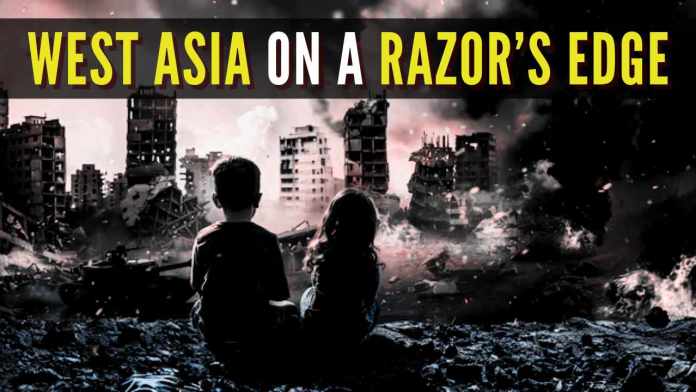
Israel’s killing of Hassan Nasrallah escalates West Asia conflict
The killing of terror leader Hassan Nasrallah, Secretary-General of Hezbollah, was one of the most daring and decisive acts by Israel since the war in West Asia broke out on October 7, 2023. Terror group Hezbollah, which, under Nasrallah’s three-decade-long leadership, emerged as a parallel state and a major power center in Lebanon, has been seen by the Israelis as their most powerful and dreaded non-state enemy. Viewed also by the US as a terror group, it is also a central constituent in Iran’s “axis of resistance”, through which Iran projects its influence across the region. By killing Nasrallah, Israel has dealt Hezbollah a heavy blow and dented Iran’s image. The region is on the threshold of a full-scale war between Israel and Iran and has the potential to engulf the entire West Asia in a major conflagration. When Israel launched its retaliatory war on Gaza after Hamas’s October 7, 2023 attack on Israel, Nasrallah, exacerbated the conflict by firing rockets into northern Israel. He wanted to keep some military pressure on the Israeli Defense Forces when the war on Gaza was on the boil. Israel played along with the limited exchange of fire in return for Hezbollah’s rockets when its focus was on cleaning up the mess in Gaza. The relentless provocation by Hezbollah led to Israel targeting Hezbollah’s ground functionaries, its commanders, and their chief Nasrallah.
Israel’s goal in the north is to enable the over 60,000 people who were displaced by Hezbollah’s rockets to return to their homes. Its targeted strikes have weakened Hezbollah but not destroyed its missile capabilities completely. The possibility of Israel launching a ground offensive into Lebanon, seeking to push Hezbollah deep into the north of the Litani River and carve a buffer on the border, appears a distinct possibility. There is no guarantee that Israel will quickly meet its objectives in Lebanon, as the Gaza conflict is also not concluding. The unique feature of the many wars being fought in different geographical locations is that they are all dragging on interminably. The Russia-Ukraine conflict is a concrete example of the inconclusive nature of modern wars. The prospect of the Israel-Gaza-Lebanon, stretching beyond the year 2024, appears a distinct possibility.
Though there is no monolithic ‘Arab’ view on the Palestine issue, as each country is keen to protect its individual strategic interests, the centuries-old religious fundamentalism, obduracy, and refusal to look beyond the narrow tenets of their respective religious beliefs act as a major roadblock in normalizing relations. There is also the grim possibility that Iran would like to throttle the Strait of Hormuz, and the Bab al-Mandeb Strait leading into the Red Sea and the Suez Canal which carries around 12 percent of all global trade, thereby creating a global economic crisis. Adding to the discomfiture of nations is the absence of a strong leader across the globe, and the simultaneous rise of many countries and terror groups, who have acquired missile and drone technology.
This new era runs many risks. There is the risk that Iran, at any moment will convince itself that it is finally time to use a crude nuclear weapon, considering this option as the only way to destroy Israel, which has, achieved a technological breakthrough in penetrating iPhones and pagers and computer systems and implanting explosives. A full-scale war, or even a more limited one, could be devastating for Lebanon, Israel, and Iran, and the presence of nuclear weapons, ballistic missiles, and raging fundamentalism is a particularly toxic potion, that may escalate into a global conflagration.
The Israeli state and its people will definitely prioritize the conflict over any other regional diplomatic architecture, that many nations are conspiring to impose on them. For this, Israel’s Prime Minister, Benjamin Netanyahu, despite his lack of popularity and calls for his removal, will have to necessarily fight a diplomatic war, apart from the country’s continuing military engagement, that is likely to enter into the year 2025. The Jewish people need to read the famous poem by Lord Alfred Tennyson – The Charge of the Light Brigade, in stanza III it reads:
“Cannon to right of them,
Cannon to left of them,
Cannon in front of them
Volleyed and thundered;
Stormed at with shot and shell,
Boldly they rode and well,
Into the jaws of Death,
Into the mouth of hell
Rode the six hundred.”
For Israelis, instead of “cannon”, it should be “death”. They are surrounded by nations that live by terror and brute violence, hardcore dictatorships, and extremist organizations, whose mission and vision, is the total annihilation of the Jewish race. This is not the time for Israelis to even whisper about democracy and elections. What is happening is a dress rehearsal for the next Holocaust. Iran, Lebanon, Syria, and a wide range of fundamentalist terror groups look upon Israel not just from a Huntington perspective, that is, as a clash of civilizations, but as hard-core sacred religious wars, that look beyond geography, borders, and humanity. In such a brutal environment, seeking peace among rubble and ruins is futile and preposterous.
Note:
1. Text in Blue points to additional data on the topic.
2. The views expressed here are those of the author and do not necessarily represent or reflect the views of PGurus.
For all the latest updates, download PGurus App.
- The Miracle of Visa Venkateshwara - February 4, 2026
- New Year at Tirumala Hills - January 27, 2026
- Tryst with Lord Venkateshwara’s crown jewels - January 10, 2026










